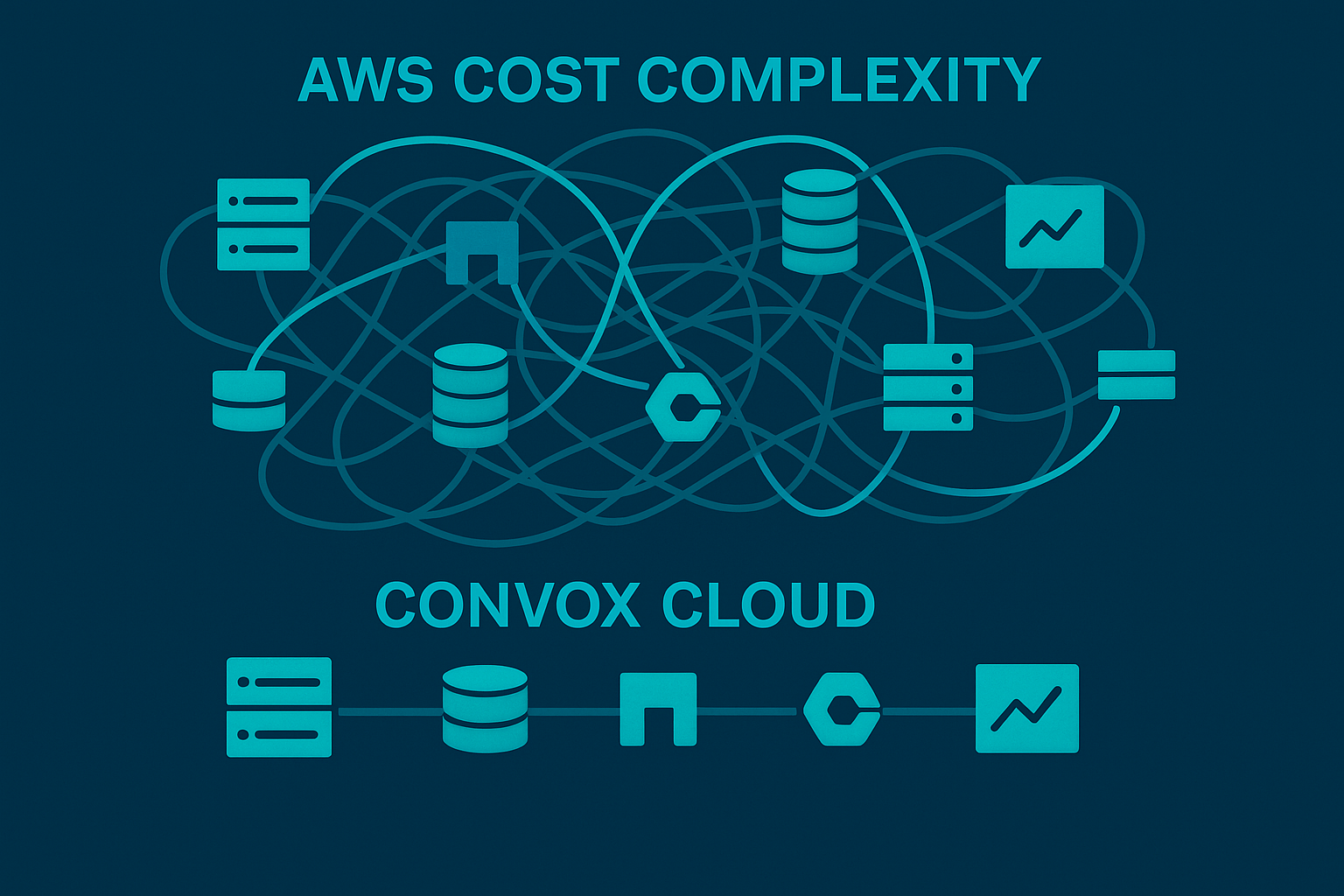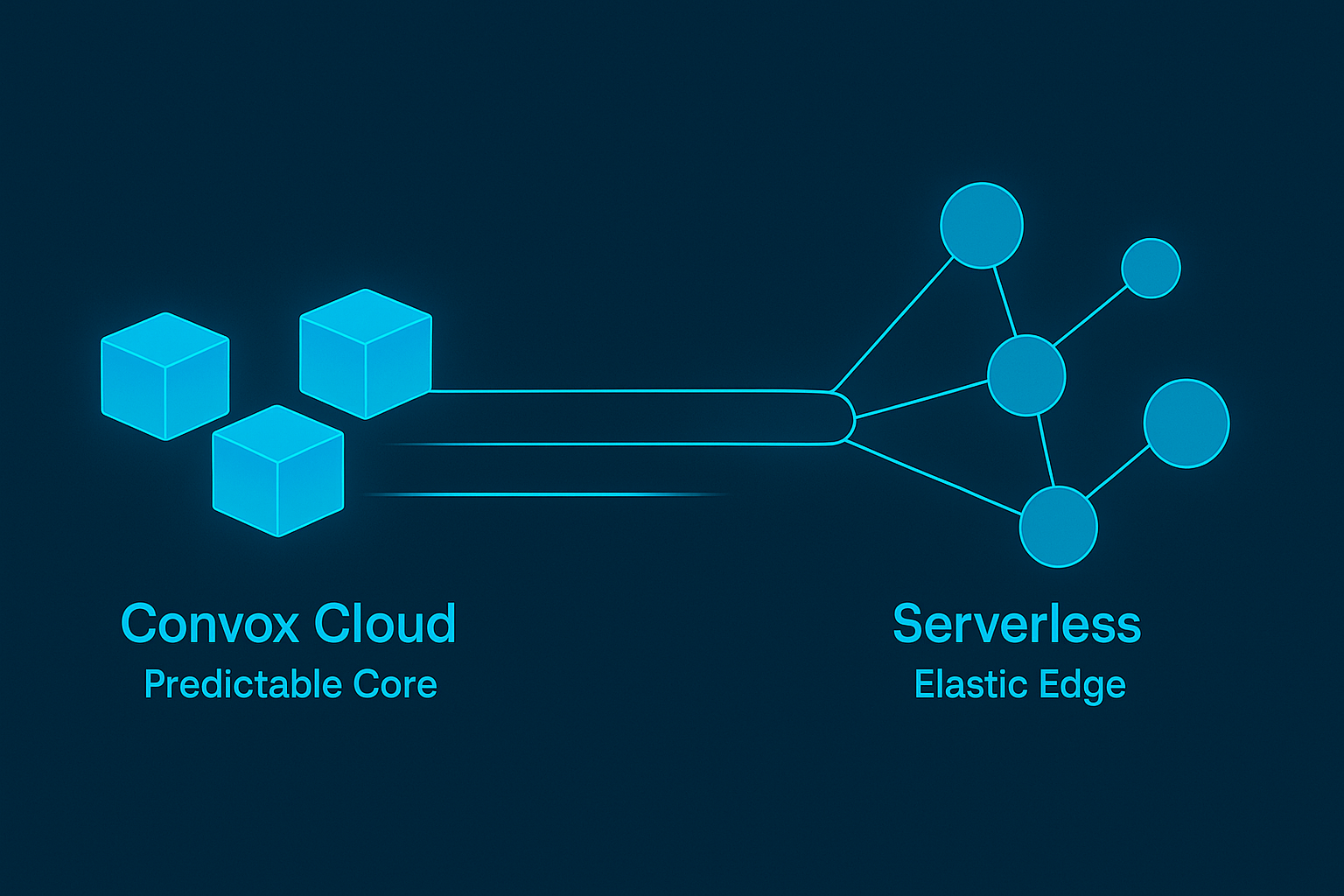
You've just launched your startup's MVP. Traffic is growing, your team is shipping features daily, and then it arrives — a cloud bill that's triple what you budgeted. Welcome to "cloud bill shock," the unwelcome surprise that hits when AWS's 200+ services, each with their own pricing model, combine in ways you never anticipated.
This isn't just about cost — it's about focus. Every hour your team spends decoding AWS bills or optimizing instance types is an hour not spent building your product. For startups racing against time and runway, this hidden operational cost can be as damaging as the financial surprise.
In this guide, we'll explore how Convox Cloud's fixed per-machine pricing offers a radical alternative to traditional pay-as-you-go cloud billing. We'll show you real numbers, real scenarios, and help you understand when predictable pricing beats "elastic" pricing — and when it doesn't.
Traditional cloud providers like AWS, Azure, and GCP operate on a pay-as-you-go model that sounds perfect in theory: pay only for what you use. In practice, it's a different story.
A production-ready application on AWS typically involves:

Each service has its own pricing model. Some charge by the hour, others by request count, data volume, or complex "capacity units." A study by CloudHealth found that the average AWS customer uses 30+ distinct services, creating bills that can run dozens of pages.
The NAT Gateway Trap: One startup discovered their NAT Gateway was costing $300/month — not for the gateway itself ($45/month), but for processing internal traffic between availability zones at $0.045/GB. Their microservices architecture was literally charging them for talking to each other.
The Forgotten Load Balancer: An Application Load Balancer costs ~$18/month base fee plus usage charges. One team left three test ALBs running for six months — $324 in forgotten infrastructure that provided zero value.
The CloudWatch Surprise: Basic metrics are free, but detailed monitoring, custom metrics, logs, and dashboards add up quickly. One company's CloudWatch bill exceeded their compute costs simply from aggressive logging in development.
Convox Cloud takes a fundamentally different approach: one machine, one price, everything included.
When you provision a Convox Cloud machine, you get:
This isn't just infrastructure — it's a complete platform. You're not buying a server; you're buying a slice of fully-managed, production-ready platform.

Convox Cloud offers four machine sizes:
| Machine Size | vCPU | RAM | Monthly Price | Hourly Price |
|---|---|---|---|---|
| X-Small | 0.5 | 1 GB | $8* | $0.016 |
| Small | 1 | 2 GB | $25 | $0.034 |
| Medium | 2 | 4 GB | $75 | $0.102 |
| Large | 4 | 8 GB | $150 | $0.205 |
*X-Small includes 250 free hours/month — perfect for development or staging environments.
The key insight: the price is the price. Run one service or ten. Transfer 10GB or 1TB of data. Deploy once or continuously. The price doesn't change.
Let's model a typical early-stage SaaS application: a web frontend, API backend, background workers, and PostgreSQL database serving 50,000 monthly active users.
Building this "properly" on AWS requires:
Compute & Scaling:
Database:
Networking & Load Balancing:
Storage & Monitoring:
Total AWS Monthly Cost: ~$249.64
But here's what this doesn't include:
Industry estimates suggest these operational tasks require 10-20 hours/month of engineering time. At $150/hour, that's another $1,500-3,000 in hidden costs.
The same application on Convox Cloud:
Option 1: All-in-One
Option 2: High Availability
Setup time? Under 30 minutes. Ongoing maintenance? Near zero — Convox handles OS updates, Kubernetes upgrades, SSL renewals, and security patches automatically.
Predictable Growth Startups
Example: A project management SaaS with 100 customers growing 10% monthly. You can plan machine upgrades quarters in advance, budget precisely, and focus on features instead of infrastructure.
Small Teams Without DevOps
convox deploy, scale with convox scaleCost-Conscious Organizations
Highly Variable Workloads
Example: An event ticketing platform that's idle 350 days/year but needs 50x capacity during major launches. Paying for peak capacity year-round would be wasteful.
Specialized Requirements

Smart teams often combine predictable and elastic infrastructure:
# On Convox Cloud - Predictable core
services:
web:
build: .
port: 3000
scale:
count: 2
cpu: 500
memory: 1024
api:
build: ./api
port: 8080
scale:
count: 3
cpu: 750
memory: 2048
# On AWS Lambda - Elastic edges
# Image processing, PDF generation, etc.
# Triggered via API calls from Convox servicesRun your steady-state workloads on Convox Cloud for predictable costs, offload spiky operations to serverless functions. You get cost predictability for 95% of your infrastructure and elasticity where it matters.
1. Start with Non-Production
2. Migrate Stateless Services First
3. Database Strategy
4. Gradual Traffic Shift
The migration is even simpler — Convox's convox.yml is similar to Heroku's approach:
Heroku Procfile:
web: node server.js
worker: node worker.jsConvox convox.yml:
services:
web:
build: .
command: node server.js
port: 3000
worker:
build: .
command: node worker.jsCost comparison? A Heroku Performance-M dyno costs $250/month for 2.5GB RAM. Convox Cloud's Medium machine (2 vCPU, 4GB RAM) costs $75/month and can run multiple services.
1. Implement Cost Attribution
2. Automate Environment Lifecycle
3. Regular Cost Reviews
1. Right-Size Your Machines
$ convox scale
NAME DESIRED RUNNING CPU MEMORY
web 2 2 45% 67%If consistently under 50% utilization, consider downsizing.
2. Pack Services Efficiently
convox ps and convox scale3. Leverage Free Tier
When evaluating cloud platforms, consider the complete picture:
AWS True Costs:
Convox Cloud True Costs:
For a typical startup, the engineering time saved with Convox Cloud often outweighs any premium in infrastructure costs. At $150/hour for engineering time, saving just 10 hours/month equals $1,500 — far more than any infrastructure cost difference.
Cloud bill shock isn't just about unexpected costs — it's about unpredictable operations that distract from your core mission. For most startups, the question isn't "How can we minimize cloud costs?" but rather "How can we minimize the total cost of shipping features?"
Convox Cloud's fixed pricing model offers something invaluable: simplicity. One price, zero surprises, minimal operations. It's infrastructure that gets out of your way so you can focus on what matters — building your product and serving your customers.
The math is compelling, but the real value is peace of mind. When you know exactly what your infrastructure will cost next month, next quarter, and next year, you can plan with confidence. When deployment is just convox deploy, you can ship with velocity. When the platform handles all the complexity, you can focus on complexity that matters — your business logic, not your infrastructure.
Ready to escape cloud bill shock? Start with Convox Cloud's free tier — 250 hours/month on X-Small machines, no credit card required. Deploy your first app in under 10 minutes and experience the difference predictable pricing makes.
Running into issues or have questions?
With Convox Cloud, you're not just choosing a platform — you're choosing freedom from cloud bill anxiety and infrastructure complexity. The 250 free hours monthly on our X-Small tier gives you room to test your applications and validate your infrastructure needs before committing to any costs.
Ready to break free from cloud bill shock? Sign up for Convox Cloud and deploy your first application today. Experience what true cost predictability feels like — your applications, your budget, your peace of mind, powered by Convox Cloud.
Note: Pricing current as of October 2025.
